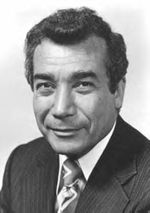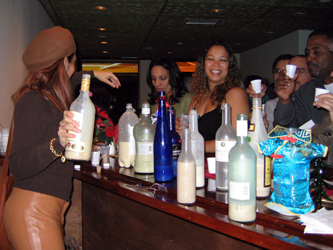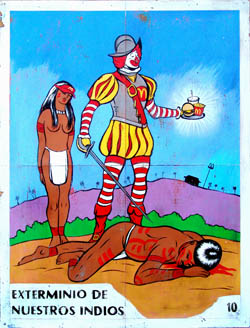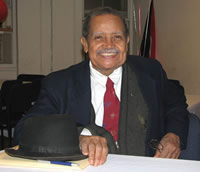
By Carl Campanile
New York Post (Tuesday, December 19, 2006), page 8
Herman Badillo has dropped a bombshell on his fellow Hispanics – charging that too many are mired in poverty because they don’t value education.
“Education is not a high priority in the Hispanic community . . . Hispanics have simply failed to recognize the overriding importance of education,” the first native-born Puerto Rican elected to Congress writes in his new book, “One Nation, One Standard.”
“Hispanics have failed to assume responsibility for their children’s welfare . . . Hispanic parents rarely get involved with their children’s schools. They seldom attend parent-teacher conferences, ensure that children do their homework or inspire their children to dream of attending college,” he adds.
Badillo writes that many Spanish-speaking immigrants are hard workers, but that to get their children to move up the economic ladder would require a cultural shakeup of sacrifice and “self-improvement” by putting education first – as Asian and other U.S. immigrant groups have.
Hispanics can no longer rely on schools and the government to do it for them, he writes. He further blames “self-segregation” – not discrimination – as a major impediment to progress for many Hispanics. Instead of focusing on assimilating into the American fabric, he writes, too many view themselves as aggrieved minorities.
“Many Hispanic parents seem to accept the characterization of their community as a minority group, something they would find incomprehensible in the Latin and Caribbean countries from which they come,” he writes. “They accept labels such as ‘brown people’ or ‘people of color.’
“Having gone along with such characterizations, some Hispanics behave as if they actually were a persecuted ethnic group, with a permanently diminished capacity for success,” the controversial autobiography says.
Hispanic immigrants would be better served by embracing the American ideal of “one nation, one standard,” Badillo adds.
Badillo, 77, says his own rags-to-riches story proves that the poor – including Hispanics – can become successful. Orphaned in Puerto Rico, he came to the mainland as a boy knowing no English and went on to become the city’s first Puerto Rican borough president, in The Bronx, as well as a congressman, top adviser to three mayors, and CUNY chancellor.
Bronx Democratic leader José Rivera blasted Badillo’s comments as a “total insult” to Latino parent- advocates who fought for decades to get the city to better educate their kids.
“This is unfair. You cannot write a book blaming the victim,” said Rivera.
Instead, Rivera blamed Badillo for educational shortcomings of Latinos – because Badillo held city leadership positions overseeing education under Mayors Rudy Giuliani and Ed Koch.
“He was part of the system that miseducated our children for many years. We are constantly being shortchanged,” Rivera said.
From Amazon.com:
Review
Linda Chavez, author of Out of the Barrio
Herman Badillo is a true leader who doesn’t flinch from expressing difficult truths. His own amazing story provides inspiration and the moral authority that allows him to advocate hard choices for American Hispanics.
Mario Cuomo, former governor of New York
He provides nourishment for intelligent people who call themselves liberals and equally intelligent people who call themselves conservatives. I call him brilliant.
Rudolph W. Giuliani, former mayor of New York City
The greatest lesson of Herman Badillo’s story is that the genius of American life—the upward ladder of opportunity that American freedom at its best provides—is better at solving most any problem than any government program.
Edward I. Koch, former mayor of New York City
Herman’s recollections on a host of important national issues, described and discussed in One Nation, One Standard, are fascinating. It is a wonderful read.
Book Description
Why aren’t Hispanics succeeding like Asians, Jews, and other immigrant groups in America? Herman Badillo’s answer is as politically incorrect as the question: Hispanics simply don’t put the same emphasis on education as other immigrant groups.
As the nation’s first Puerto Rican–born U.S. congressman, the trailblazing Badillo once supported bilingual education and other government programs he thought would help the Hispanic community. But he came to see that the real path to prosperity, political unity, and the American mainstream is self- reliance, not big government. Now Badillo is a champion of one standard of achievement for all races and ethnicities.
In this surprising and controversial manifesto, you will learn:
* Why Hispanic culture’s trouble with education, democracy, and economics stems from Mother Spain and the “five-hundred year siesta” she induced in Latin America.
* Why the Congressman who drafted the first Spanish-English bilingual education legislation now believes that bilingual education hurts students more than it helps.
* Why “social promotion” — putting minority students’ self-esteem ahead of their academic performance and then admitting them to college unprepared — continues to this day, despite the system’s documented failures and injustices.
* How self-identifying as “Hispanic” or “white” or “black” undermines achievement, and what lessons we can learn from Latin American countries, where one’s race is irrelevant.
With Central and Latin America exporting a large portion of their poor, Hispanics are on the way to becoming a majority in the United States… but one with all the problems of a minority culture.
Badillo’s solution to this problem relies on traditional values: hard work, education, and achievement. His lessons are important not only for Hispanics but for every American.
About the Author
Herman Badillo was the nation’s first Puerto Rican– born congressman. He also served as the borough president of the Bronx, deputy mayor of New York City, and chairman of the board of the City University of New York. Currently he is a senior fellow at the Manhattan Institute.




